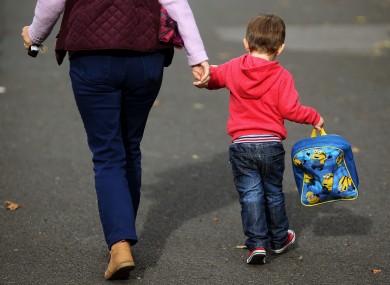CHILDREN CARED FOR by relatives or figures such as childminders experience fewer emotional and peer problems than children who are looked after by their parents full-time, according to a new report published today by the ESRI and Pobal.
The report looked at how children behaved at age three and age five. It based its judgements on children’s social skills, such as sharing and kindness to other children, and their difficulties, such as behavioural problems, emotional difficulties and peer problems, as reported by their parents and teachers.
Across the different types of care – care from parents, relative, a non-relative and in a crèche – children had fewer problems when cared for by non-parental relatives or non-relatives, such as childminders, than children cared for full-time by their parents.
The study looked at around half of the circa 9,000 children, more than half of whom were cared for by people other than their parents.
Children in creches
While both parents and teachers did not highlight any major differences in socio-emotional difficulties between children who were in full-time parental care or were taken care of in a crèche, children from the lowest social categories or lone-parent households were shown to benefit more from crèche care.
While figures from the report show differences in children’s social skills and emotional difficulties depending on the type of care they received, it does highlight that other factors such as the child’s health, gender socio-economic background, family structure, and family factors such as parenting style and parental stress had a greater effect on these issues.
Boys were more likely to experience some form of emotional or behavioural issues, as were children living in households experiencing financial difficulties and those living in less safe neighbourhoods.
“Statistically significant”
One of the authors of the report, Helen Russell, associate research professor at the ESRI, told TheJournal.ie that while the differences between parental care and non-parental care were small, they were still “statistically significant”.
She said: “There is already a move towards centre-based care as more and more parents make that choice. Relatives still have a very important role to play in childcare and this report shows the benefits that care from a family member can have.
There are certainly benefits to children of having forms of care outside the home. New measures to assist those paying for childcare announced in the Budget will certainly help, but the emphasis on quality across all forms of care is paramount.”
As announced in the recent Budget, a new subsidy scheme will provide parental-means tested subsidies toward the cost of childcare for children aged six months to 15 years and universal subsidies of up to €80 a month or €900 a year for all children aged between six months and three years.
Children’s Minister Katherine Zappone told TheJournal.ie in a Facebook Live interview that she is exploring proposals to bring childminders into the childcare subsidies scheme, and said that she understood that some parents have a “huge preference” to have their children looked after by childminders.
The data used to compile this report came from the Growing up in Ireland study, a government-funded study of children being carried out jointly by the ESRI and Trinity College Dublin.
The study, entitled, Childcare, Early Education and Socio-emotional Outcomes at Age 5: Evidence from the Growing Up in Ireland Study, is available to view on the ESRI website.

